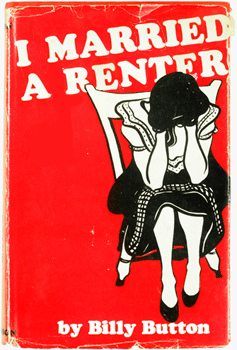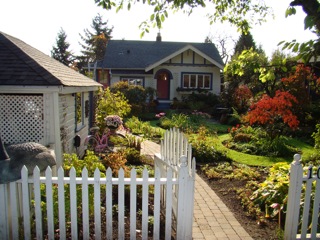“I’m STILL getting emails from clients who believe the magic way to make money is to invest in real estate. One client emailed just last week and asked what I thought about her buying a property in some small-town in Ontario, renovating it and flipping it. Um, what? Bearing in mind they currently “own” a principal residence in the Okanagan which I’m pretty sure they have ZERO equity in (they took out all the equity with a HELOC to finance their struggling business). But they still have this idea that if they just buy the right property and renovate it (with very little down, the DP will come from RRSPs) it will be a quick flip and they’ll be in the $$$. It took me days to figure out how to write a tactful reply which didn’t include phrases like “are you out of your mind?” and “what have you been smoking?”
– pricedoutfornow at VREAA 20 Dec 2011 9:46am


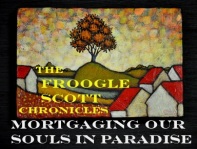









Most Recent Comments:
- Maria Ter on “Over the years, we refinanced our home a few times to pay off our debts. Now we’re selling our home as we can’t keep up with mortgage payments. In this market, we’re not sure if we’ll break even.”
- space889 on “I’m surprised that everyone else is so surprised to hear anyone talk about a housing bubble” – “Canadian RE 2021 worse than U.S. bubble at 2006 peak” – David Rosenburg
- amitamv on “I’m surprised that everyone else is so surprised to hear anyone talk about a housing bubble” – “Canadian RE 2021 worse than U.S. bubble at 2006 peak” – David Rosenburg
- Keith on “I’m surprised that everyone else is so surprised to hear anyone talk about a housing bubble” – “Canadian RE 2021 worse than U.S. bubble at 2006 peak” – David Rosenburg
- Judy Green on “I’m surprised that everyone else is so surprised to hear anyone talk about a housing bubble” – “Canadian RE 2021 worse than U.S. bubble at 2006 peak” – David Rosenburg
- space889 on “I’m surprised that everyone else is so surprised to hear anyone talk about a housing bubble” – “Canadian RE 2021 worse than U.S. bubble at 2006 peak” – David Rosenburg
- Seeking Knowledge on “I’m surprised that everyone else is so surprised to hear anyone talk about a housing bubble” – “Canadian RE 2021 worse than U.S. bubble at 2006 peak” – David Rosenburg
- vreaa on “I’m surprised that everyone else is so surprised to hear anyone talk about a housing bubble” – “Canadian RE 2021 worse than U.S. bubble at 2006 peak” – David Rosenburg
- space889 on “I’m surprised that everyone else is so surprised to hear anyone talk about a housing bubble” – “Canadian RE 2021 worse than U.S. bubble at 2006 peak” – David Rosenburg
- space889 on “I’m surprised that everyone else is so surprised to hear anyone talk about a housing bubble” – “Canadian RE 2021 worse than U.S. bubble at 2006 peak” – David Rosenburg
- Conflarian on “I’m surprised that everyone else is so surprised to hear anyone talk about a housing bubble” – “Canadian RE 2021 worse than U.S. bubble at 2006 peak” – David Rosenburg
- Conflarian on “I’m surprised that everyone else is so surprised to hear anyone talk about a housing bubble” – “Canadian RE 2021 worse than U.S. bubble at 2006 peak” – David Rosenburg



-
Type of Anecdote
- 01. He Said, She Said (248)
- 02. Profiting from the Boom (446)
- 03. Changed my Life (106)
- 04. Changed my Career (39)
- 05. Where do Buyers get the money? (1,111)
- 06. Held my Nose and Leapt (97)
- 07. Avoiding Vancouver (378)
- 08. Overextended Buyers (1,198)
- 09. Delaying Buying (316)
- 10. Demoralized Renters? (367)
- 11. Regrets about Investing in RE (417)
- 12. Effects of Development (279)
- 13. 2010 Olympics Related (74)
- 14. Social Effects of the Boom (1,266)
- 15. Misallocation of Resources (967)
- 16. Missed The Boat? (237)
- 17. The Froogle Scott Chronicles (27)
- 18. Spot The Speculator (174)
- 19. BlastRadiusPostCards (17)
- 20. The Limitless Demand Argument For Ongoing Market Strength (70)
- 21. Vancouver RE-Verse [Found Poems] (8)
- 22. RE References In Popular Culture (45)
- 23. Jumping The Shark (1)
- 24. Policies On Housing (11)
- 25. Epigrams For The Bubble (1)
- 26. Premature Calls Of "Bottom" (3)
- 27. Seller Panic (3)
- 28. Erroneous Causation Theories For Falling Prices (7)
- 29. Bubblespeak (1)
- Uncategorized (177)








Blogroll
- 01 Vancouver Condo Info
- 02 AmericaCanada [retired, no archive]
- 03 Housing Analysis
- 04 RealEstateTalks BC
- 05 Vancouver RE and then some
- 06 Whispers from the Village on the Edge of the Rainforest
- 07 Greater Fool
- 08 Canada Bubble
- 09 Rob Chipman's blog
- 10 YatterMatters
- 11 condohype [retired; archives available]
- 12 vancouver (un)real estate
- 13 Agent Will's Stats [retired]
- 14 Landlord Rescue
- 15 The Economic Analyst
- 16 Canadian Housing Price Charts
- 17 Hoodsurf [retired Jun 2011]
- 18 World Housing Bubble
- 19 Vancouver Price Drop
- 20 North American Economics


-
Latest Anecdotes:
- “I’m surprised that everyone else is so surprised to hear anyone talk about a housing bubble” – “Canadian RE 2021 worse than U.S. bubble at 2006 peak” – David Rosenburg
- “Always the Right Time to Buy!” – Cheap Rope For Vancouver RE Buyers
- Mortgage Squeeze Anecdotes – “Two days ago my mortgage holder called and told me that, after 22 years, they would not renew my mortgage.”
- Wow! – CMHC CEO Evan Siddall Points To Unsustainable Debt & Calls For 18% Drop In Housing Prices – [which of course would mean a lot more off]
- Prediction: Vancouver RE Prices Will Not Crash… Unless They Crash
- Pre-Existing Disease – COVID Economic Stress Uncovers Longstanding Vulnerability in Vancouver RE Market
- COVID-19 the Pin for the Highly Debt-Leveraged Vancouver RE Bubble?
- Vancouver Sun Headline – ‘Five more Metro Vancouver homeowners hosed in a falling market’
- Vancouver RE Prices – Where is the Support?
- Money Laundering & Vancouver Home Prices
- “Psychologically, They’re Ill-Prepared” – “Canadian Chaos Looms”
- Keeping Up With Other Bubbles – Australia Suddenly Not Running Out Of Land Anymore – “Aussie House Prices Could Halve”
- Watershed? or Dam-Collapsing? – Mainstream Media Quoting Vancouver RE Bear-Tweets, and Predicting Shrinking Realtor Numbers – “What they’re used to is not what real estate is typically like.”
- “Within artistic communities in Vancouver it’s hard to spend more than 15 minutes at a social gathering without talking about the cost of rent or knowing of someone who is being evicted.”
- Macleans Wakes Up – ‘This is how Canada’s housing correction begins’ – “We’re not ready for what happens next”
- Vancouver Detached – Sales Down, Prices Down
- Bloomberg Calls Vancouver ‘The City That Had Too Much Money’
- “Our family loves Vancouver, but we’re leaving because the struggle to live here is simply too hard”
- Tendency Towards Corruption Is Inevitable – How Do We Minimize Its Existence?
- Hard Earned Home Savings? Hardly.
- “You know your real estate is in bad shape when there is a game app that displays Vancouver’s Science World and teaches you how to be a money hungry real estate developer.”
- “It’s sinking in that Vancouver is sinking” – “Westside prices have fallen 17% from 2016 & 11% this year; sales volumes down by 80%; 3 years worth of >$3 Million inventory”
- The Carrion Have The Carcass – “I’ve lived in Vancouver since 1968; my wife was born here; we are about to leave; this town has priced us out. All that is left are the investors and the very rich visitors.”
- All Time High, And Climbing… $251 Billion Personal Debt Borrowed Against Canadian Homes
- “I asked a group of young people how many of them thought they’d be in Vancouver in two years, and 17 out of 18 said that they would be moving.” – Mayoral Candidate Shauna Sylvester
- Off-The-Charts Unaffordable – Greater Vancouver Price-To-Income Ratio 28 (average home price: $1,071,800, median one-person income: $38,164)
- Conflicts of Interest – BC MLAs Heavily Invested In RE Making Laws About RE
- File Under Tags: ‘Tolerant Vancouver Renter’ and ‘YouGottaBeKiddinMe’
- Vancouver “an international housing-affordability basket case” with “RE bubble risk the worst in the world” – Maclean’s
- Vancouver Economy Over-Dependent On Debt Spending
- Vancouver City Councillors Wake Up To ‘Fierce Speculative Demand’ – “There is significant evidence speculative investment has the biggest impact on housing costs in the city.”
- The Dance Around Foreign Ownership of Vancouver RE
- Information From Outside The Vancouver RE Bubble – U.S. Senator Lives In (don’t laugh) $500K Home
- “The Position Remains Unfilled”
- Jessica Barrett – ‘I Left Vancouver Because Vancouver Left Me’ – “Like Living On An Abandoned Film Set.”
- “I’ve thought since early 2010 that Vancouver housing was in a bubble, and have refused to buy a house for this reason. I’ve felt that the risk of mean-reversion was far higher than the risk of missing the upside.”
- “It is very difficult to live here.”
- “We want young people to buy Real Estate.” – Vancouver’s Mayor
- “Vancouver RE Balloon Pricked; Median Price Detached Home Down >$500,000 to $1.7 million; Prices Need To Be Slashed”
- Detached Price Trend Remains Up, For Now. Speculators Hold Their Breath?
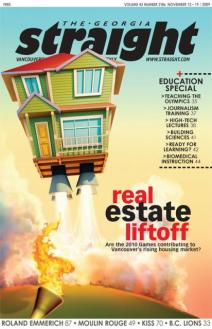

Follow vreaa on twitter
Tweets by vreaa


VREAArchives
- March 2021
- June 2020
- May 2020
- April 2020
- December 2019
- July 2019
- May 2019
- April 2019
- February 2019
- January 2019
- December 2018
- October 2018
- September 2018
- June 2018
- May 2018
- April 2018
- March 2018
- February 2018
- January 2018
- December 2017
- November 2017
- October 2017
- September 2017
- August 2017
- June 2017
- May 2017
- April 2017
- March 2017
- February 2017
- January 2017
- December 2016
- November 2016
- October 2016
- September 2016
- August 2016
- July 2016
- June 2016
- May 2016
- March 2016
- February 2016
- January 2016
- December 2015
- November 2015
- October 2015
- September 2015
- August 2015
- July 2015
- June 2015
- May 2015
- April 2015
- December 2014
- October 2014
- September 2014
- August 2014
- July 2014
- June 2014
- May 2014
- April 2014
- March 2014
- February 2014
- December 2013
- July 2013
- June 2013
- May 2013
- April 2013
- March 2013
- February 2013
- January 2013
- December 2012
- November 2012
- October 2012
- September 2012
- August 2012
- July 2012
- June 2012
- May 2012
- April 2012
- March 2012
- February 2012
- January 2012
- December 2011
- November 2011
- October 2011
- September 2011
- August 2011
- July 2011
- June 2011
- May 2011
- April 2011
- March 2011
- February 2011
- January 2011
- December 2010
- November 2010
- October 2010
- September 2010
- August 2010
- July 2010
- June 2010
- May 2010
- April 2010
- March 2010
- February 2010
- January 2010
- December 2009
- November 2009
- October 2009
- September 2009
- August 2009
- June 2009
- May 2009
- April 2009
- March 2009
- February 2009
- January 2009
- October 2008
- September 2008
- July 2008
- June 2008
- May 2008
- April 2008
- March 2008
- February 2008
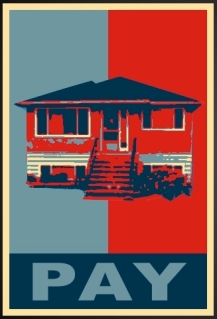
Tags
affordability Alberta Anecdotes Asia Audio anecdote Australia Bailout Banks Bears blogs British Columbia Bubble Bulls buyers Canada Capitulation Caveat Children China CMHC Construction Crime Debt Densification Developers Dreams Earthquake Economy Edmonton Employment Fear Foreclosure Foreign buyers FTBs Fundamentals Government Housing Incomes Interest Rates Ireland Landlords Life Market_Timing Media Mortgage brokers Okanagan Olympics ontario opinion Ottawa Ownership Prediction Rain Real Estate Realtors Relationships Renos Rent Retirement RE_ATM Seattle sellers Sentiment Speculators Stories Tax Technical Analysis Toronto UBC UK US Vancouver Victoria Visual Anecdote Whistler